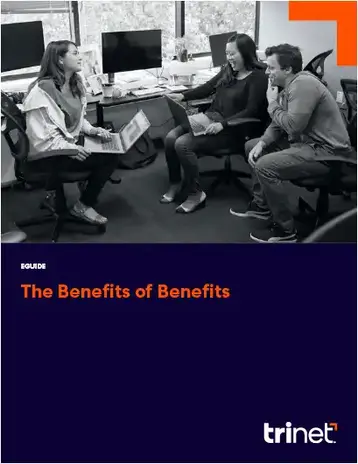
Employers with 20 or more employees and a group health plan must generally offer continuation coverage under the Consolidated Omnibus Budget Reconciliation Act (COBRA), also known as “federal COBRA.” If your business is very small, you’re probably not off the hook, because many states have mini-COBRA laws that apply to businesses with fewer than 20 employees. To understand state mini-COBRA laws, you need to know about federal COBRA. If your business has fewer than 20 employees, you may be subject to a state mini-COBRA law.
What is federal COBRA?
The federal COBRA law applies to employers that have a group health plan, and 20 or more employees on over 50% of their normal business days in the previous year. Under federal COBRA, employers must temporarily extend continuing health coverage to qualified beneficiaries (QBs) who experience a qualifying event that would otherwise result in loss of coverage. Qualified beneficiaries include the covered employee, their current or former spouse, and their dependent children. What constitutes a “qualifying event” varies by QB, but generally includes termination of employment for reasons other than gross misconduct, reduction in work hours, divorce or legal separation, and loss of dependent-child status. COBRA continuation coverage usually lasts for 18 months, but in some cases, it can last for 29 months or 36 months. Group health plans that provide medical care are subject to federal COBRA rules. These plans typically cover:
- Inpatient and outpatient hospital care
- Major medical benefits (e.g., surgery)
- Doctor care
- Prescription medications
- Mental health services
- Dental and vision care
Health flexible spending accounts and some health reimbursement arrangements are subject to COBRA rules, as well. The same goes for telehealth, wellness programs, and employee assistance programs that offer medical care. As the plan sponsor, you can charge QBs the entire COBRA premium along with a 2% administrative fee — a total of 102%. For disabled QBs who receive an 11-month COBRA extension (29 months in total), you can charge up to 150% of the group rate. Many states have regulations that are similar to federal COBRA. These state regulations are known as “mini-COBRA.”
What are mini-COBRA laws?
Like federal COBRA, mini-COBRA laws require group health plans to offer continuing health coverage to QBs who would otherwise lose coverage due to a qualifying event. A key difference between them is that mini-COBRA laws are more generous when it comes to who is covered. Unlike federal COBRA, which covers only employers with 20 or more employees, mini-COBRA laws generally cover employers with fewer than 20 employees. In a few states, 2-19 employees is the threshold. Some states require nearly all employers, regardless of size, to comply with mini-COBRA. Coverage duration varies by state. It can be as short as from 2 to 6 months, and as long as 39 weeks or indefinitely if the employee meets certain conditions (such as becoming totally disabled while employed). In some states, QBs qualify for mini-COBRA regardless of whether the covered employee was terminated for gross misconduct. Along with specifying who’s covered, mini-COBRA laws may address the following:
- Who is a qualified beneficiary
- What constitutes a qualifying event
- Which health plans and benefits are subject to continuation
- How long continuation coverage can last
- Maximum premium that employers can charge QBs for state continuation coverage
While many states adhere to the same maximum premium charge as federal COBRA (i.e., 102% in general), some states allow employers to charge more, or up to the group rate.
Which states have mini-COBRA laws?
The following 40 states have some type of mini-COBRA law:
- Arkansas
- California
- Colorado
- Connecticut
- District of Columbia
- Florida
- Georgia
- Illinois
- Iowa
- Kansas
- Kentucky
- Louisiana
- Maine
- Maryland
- Massachusetts
- Minnesota
- Mississippi
- Missouri
- Nebraska
- Nevada
- New Hampshire
- New Jersey
- New Mexico
- New York
- North Carolina
- North Dakota
- Ohio
- Oklahoma
- Oregon
- Rhode Island
- South Carolina
- South Dakota
- Tennessee
- Texas
- Utah
- Vermont
- Virginia
- West Virginia
- Wisconsin
- Wyoming
Does mini-COBRA have notice requirements?
If your business is subject to mini-COBRA, you must notify eligible employees of their right to continuation coverage under state law. The notification deadline varies by state, so make sure you check state law to ensure timely distribution. Though other mini-COBRA notice requirements differ by state, they may be somewhat similar to those required by federal COBRA. Federal COBRA requires covered employers to give each eligible QB a general COBRA notice detailing their right to continuation coverage under federal law. Further, the employer or the QB must notify the plan administrator when the QB experiences a qualifying event. The plan administrator must then provide the QB with an election notice, which explains how the QB can elect COBRA continuation coverage. Other federal COBRA notices may include:
- Notice of early termination of continuation coverage
- Notice of unavailability of continuation coverage
The state may have its own version of these federal notices plus additional notices. For mini-COBRA notice requirements, contact the state department of insurance.
What if both federal COBRA and state mini-COBRA laws apply?
Per The National Law Review, “State continuation coverage generally only applies when employers have less than the 20 employee minimum threshold required for federal COBRA to apply or provide coverage for a period exceeding the maximum coverage period provided for under federal COBRA.”
In short, if you have fewer than 20 employees, you likely need to follow only state mini-COBRA. But if you have 20 or more employees, both federal COBRA and state mini-COBRA laws may apply, depending on your state’s coverage rules. If both are indeed applicable, it’s important to know which one to use. Typically, when both federal and state continuation coverage apply, employers must utilize the law most favorable to the insured. Seek expert advice if you need clarification on which COBRA laws to follow.
Can other federal laws impact federal COBRA and state mini-COBRA?
Although mini-COBRA laws are state-mandated, it is possible for a separate federal law to affect both federal COBRA and state mini-COBRA. For instance, under the American Rescue Plan Act (ARPA) of 2021, employers must temporarily pay the entire federal COBRA premiums for QBs who had their work hours reduced or lost their job involuntarily for reasons other than gross misconduct. Employers must provide this COBRA premium assistance from April 1, 2021 through September 30, 2021. The premium assistance is 100% refundable (as a payroll tax credit) to the employer. If you offer state continuation coverage that is comparable to federal COBRA. you may need to comply with the ARPA’s COBRA premium assistance provisions. For details on premium assistance for COBRA benefits, see Internal Revenue Service Notice 2021-31.
This communication is for informational purposes only; it is not legal, tax or accounting advice; and is not an offer to sell, buy or procure insurance.
This post may contain hyperlinks to websites operated by parties other than TriNet. Such hyperlinks are provided for reference only. TriNet does not control such web sites and is not responsible for their content. Inclusion of such hyperlinks on TriNet.com does not necessarily imply any endorsement of the material on such websites or association with their operators.






